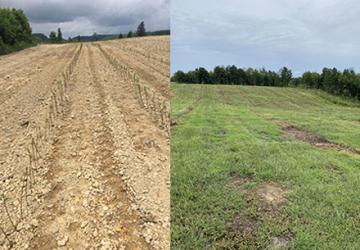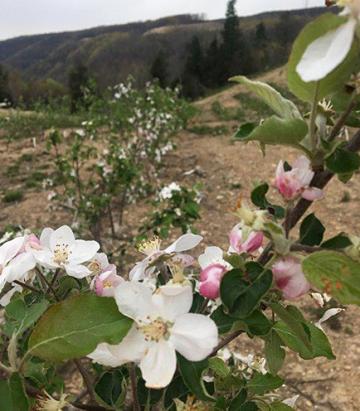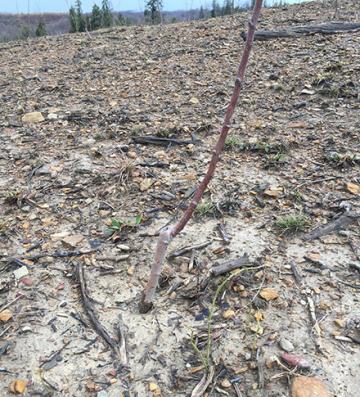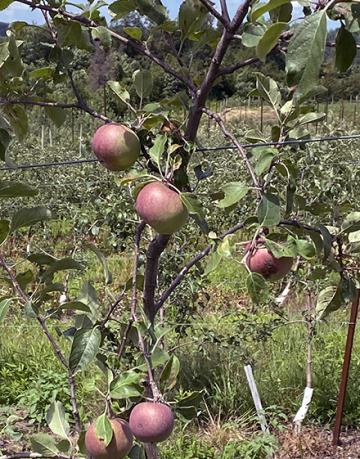Room to Grow: Turning Desolate Land into Beauty and Prosperity
Never has a local solution provided such potential for national impact. The vision belonged to the West Virginia National Guard (WVNG): take land that’s not useful for anything — abandoned mined land — and grow apples, in what they call “Patriot Apple" — a successful project between USDA ARS and the West Virginia National Guard.
“This has never been done before at a large scale,” said Tracy C. Leskey, a research entomologist, and the research leader at the at the USDA ARS Appalachian Fruit Research Station in Kearneysville, WV.
The damaged soil requires a lot of experimentation with fertilizer and other treatments to allow trees to flourish. “These lands basically look like the surface of Mars,” said Chris Dardick, a molecular plant biologist, and the Lead Scientist at the Appalachian Fruit Research Station in Kearneysville, WV. “Some of them are just really desolate, (but) there’s a lot of potential for being able to farm this marginal land that’s been created through coal mining.”

The project started in 2016, prior to a partnership with ARS. “They didn’t know what they needed to do to prepare the soil, and they didn’t know how to amend it to support apple trees,” said Dardick. ARS worked with National Guard staff to perform soil experiments — adding lime and local nutrients like chicken litter and biochar—a fine-grained charcoal—to fertilize the soils. Once the soils were optimized to support healthy tree growth in ARS greenhouses, the National Guard together with ARS set up trials to amend the mine land.
Dardick said, “They’ve been successful, and they’ve now amended nearly 150 acres. The trees are growing at a commercially acceptable rate and they should get a good fruit crop next year. The project is on a path to sustainability meaning Patriot Apple will be able to generate enough revenue from apples, nursery trees, (and honey — the other part of the project is bees) to pay salaries and sustain themselves.”
The cooperative agreement between the WVNG and ARS has allowed ARS to expand experimentation with other fruits in the amended soil. Dardick said, “We’ve had breeding programs at our location for many years for stone fruits like peaches and plums and nectarines — as well as pears — so while (the guard) put in some initial apple trials, trying different apple varieties, we are also conducting pear and stone fruit trials, as well.” Those trials are ongoing.

Orchard in bloom at the Muddelty mine site. (Photo by Doug Raines, WVMA).
Leskey, said “We can get technologies to companies that have plenty of resources to bring them to market but one of the challenges we have is with smaller growers or smaller operations. It’s more difficult for them to get access to this material at times. So, we thought this would be a great outreach effort for ARS to say, okay, we have these great varieties, some of them have real potential for niche markets where a small grower could take advantage of improved flavor, pest resistance, easier to grow kind of thing, and that’s been successful as well.” She added, “It’s really important to us to be able to have these new varieties that (Chris’s unit) has been breeding, potentially provide economic opportunities for people in a state that has a lot of challenges before it.”
Not only is the project successful in reclaiming unusable land, it is helping West Virginia to flourish. Leskey said, “It started as a project to improve the stability of the National Guard by providing economic opportunities to keep people from moving out of the state and to replace some of the extraction economy that has been shrinking.” Dardick added, “The program also aimed to help veterans with PTSD and people returning from overseas deployments. They found that working in agriculture was very beneficial psychologically and for the general well-being of soldiers. A lot of vets are getting into industries related to agriculture, even at the hobby level, and the Guard is now providing education, training, and resources.” ARS has participated in some of the training workshops on grafting, fruit evaluation and more.
The Guard wasn’t thinking about the big picture when they decided to grow apples on this land, but the project also opened the door to fixing a much larger problem across the United States: finding more land to grow food on. “We need more farmland,” said Dardick.
A lot of high quality farm land in West Virginia has been lost to housing developments, “because we are in the DC commuting area, and more people commute than ever,” said Tracy C. Leskey. “It’s easier to grow houses, someone once said to me, than it is to grow fruit.”
There are about 1.2 million acres of abandoned mined land across Appalachia — not just West Virginia, according to Dardick. This land was once mountainous but is now relatively flat. “Thus, it can be converted to potentially a new source of farmland which we desperately need,” he said. “We need to move to such marginal lands to increase (food) production, and how we’re going to accomplish that is an open question. Helping to solve this problem is a role ARS can play.” — Kelly A. Harmon, ARS Office of Communications



